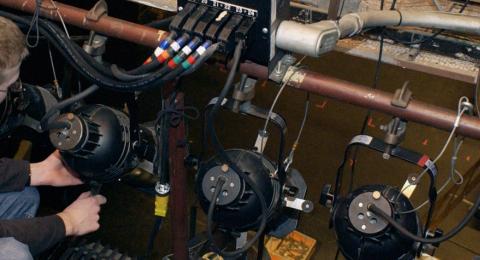The Theatre Design and Technology Option at UNH is ideal for those interested in working behind the scenes, blending artistic and technical skills to create theatrical environments. Students collaborate with award-winning faculty on personalized study plans, covering set, costume, lighting, property design, and more. The program emphasizes collaborative creativity with extensive hands-on production opportunities in all areas of technical theatre. This option can also be paired with a secondary theatre education focus for K-12 teaching.
What is design and theatre technology?
Designed for students who are interested in the magic behind the scenes, this option in the theatre degree program will prepare you to apply both artistic and technical elements with design principles to create the world for performing arts. You will work with faculty who are active artists in the profession to develop an individually tailored program of study based on your interests and skills, including set design, costume design, lighting design, puppetry design, scenic painting, stage management, technical direction and costume technology. The design and theatre technology option emphasizes the importance of collaborative creative processes and offers a wide range of hands-on production opportunities and career choices.
Why study design and theatre technology at UNH?
The UNH Department of Theatre and Dance offers various production genres every year, including musicals, plays and dance concerts. As a student in the design and theatre technology program, you will have the opportunity to gain practical experiences in all areas of technical theatre and take on design assignments for the departmental productions. You’ll also be able to pursue independent studies and be eligible to apply for R.E.A.C.H., financial assistance provided to students who participate in internships with professional theatres or dance organizations.
Potential careers
- Costume designer or wardrobe supervisor
- Film art director or production designer
- Lighting designer
- Makeup artist
- Master electrician
- Production manager
- Property master
- Set designer or scenic artist
- Stage manager
- Teaching artist
- Technical director
- Theater technician
Curriculum & Requirements
The Theatre Major: Design and Theatre Technology Option at UNH is ideal for those interested in working behind the scenes, blending artistic and technical skills to create theatrical environments for storytelling. Students collaborate with award-winning faculty on personalized study plans, covering set, costume, lighting, puppetry, stage management and more. The program emphasizes collaborative creativity with extensive hands-on production opportunities in all areas of technical theatre. This option can also be paired with a Secondary Theatre Education focus for K-12 teaching.
Designed for students who are interested in the magic behind the scenes, this option in the Theatre degree program will prepare you to apply both artistic and technical elements with design principles to create the world for performing arts. You will work with faculty who are active artists in the profession to develop an individually tailored program of study based on your interests and skills, including set design, costume design, lighting design, puppetry design, scenic painting, stage management, technical direction and costume technology. The Design and Theatre Technology Option emphasizes the importance of collaborative creative processes and offers a wide range of hands-on production opportunities and career choices.
The UNH Department of Theatre and Dance offers various production genres every year, including musicals, plays and dance concerts. As a student in the Design and Theatre Technology program, you will have the opportunity to gain practical experience in all areas of technical theatre and take on design assignments for the departmental productions. You’ll also be able to pursue independent studies and be eligible to apply for R.E.A.C.H., which provides financial assistance to students who participate in internships with professional theatres or dance organizations.
Contact Szu-Feng Chen, Paul Creative Arts Center, (603) 862-4445.
Sample Degree Plan
This sample degree plan serves as a general guide; students collaborate with their academic advisor to develop a personalized degree plan to meet their academic goals and program requirements.
| First Year | ||
|---|---|---|
| Fall | Credits | |
| THDA 459 | Stagecraft | 4 |
| THDA 460 | Elements of Design | 4 |
| THDA 401 | New Student Seminar | 1 |
| THDA 589 | Practicum | 1 |
| Discovery Course | 4 | |
| Discovery Course | 4 | |
| Credits | 18 | |
| Spring | ||
| THDA Group I Course | 4 | |
| THDA Group II Course | 4 | |
| THDA Group III Course | 2-4 | |
| THDA 589 | Practicum | 1 |
| Discovery Course | 4 | |
| Discovery Course | 4 | |
| Credits | 19-21 | |
| Second Year | ||
| Fall | ||
| THDA Group I Course | 4 | |
| THDA Group II Course | 4 | |
| THDA 589 | Practicum | 1 |
| Language Course | 4 | |
| Discovery Course | 4 | |
| Major Elective/Minor Requirement | 1-4 | |
| Credits | 18-21 | |
| Spring | ||
| THDA Group I Course | 4 | |
| THDA Group II Course | 4 | |
| THDA 589 | Practicum | 1 |
| Language Course | 4 | |
| Discovery Course | 4 | |
| Major Elective/Minor Requirement | 1-4 | |
| Credits | 18-21 | |
| Third Year | ||
| Fall | ||
| THDA Group I Course | 4 | |
| THDA Group III Course | 2-4 | |
| THDA 589 | Practicum | 1 |
| Discovery Course | 4 | |
| Discovery Course | 4 | |
| Major Elective/ Minor Requirement | 2-4 | |
| Credits | 17-21 | |
| Spring | ||
| THDA Group III Course | 2-4 | |
| THDA Group IV Course | 1-4 | |
| THDA 589 | Practicum | 1 |
| Discovery Course | 4 | |
| Discovery Course | 4 | |
| Major Elective/Minor Requirement | 2-4 | |
| Credits | 14-21 | |
| Fourth Year | ||
| Fall | ||
| THDA Group III Course | 2-4 | |
| THDA Group IV Course | 1-4 | |
| THDA 589 | Practicum | 1 |
| Major Elective/Minor Requirement | 4 | |
| Major Elective/Minor Requirement | 4 | |
| Credits | 12-17 | |
| Spring | ||
| THDA Group IV Course | 1-4 | |
| THDA 799 | Capstone Project | 2 |
| THDA 589 | Practicum | 1 |
| Major Elective/Minor Reqirement | 4 | |
| Major Elective/Minor Requirement | 4 | |
| Credits | 12-15 | |
| Total Credits | 128-155 | |
Degree Requirements
All Major, Option and Elective Requirements as indicated.
*Major GPA requirements as indicated.
Major Requirements
In the freshman and sophomore years, students should enroll for at least two major and two Discovery courses per semester.
The minimum grade requirement for major courses is C- per course. Any grade lower than C- will not count toward the major.
The required minimum overall GPA in major coursework is 2.0.
Under department policy, students who complete both COMM 401 American Sign Language I and COMM 502 American Sign Language II satisfy the bachelor of arts language proficiency requirement.
All majors must take courses in the following areas: performance, design/theatre technology and theory/history as well as fulfill between four and eight practicums and complete a capstone course. Although timing will vary with each option, it is strongly suggested that all introductory courses be taken prior to the end of the student's sophomore year. Students must also complete a digital portfolio that demonstrates fulfillment of student learning outcomes related to their area of study.
Candidates for a degree must satisfy all of the University Discovery Program requirements in addition to satisfying the requirements of each individual major program. Bachelor of arts candidates must also satisfy the foreign language proficiency requirement.
Theatre department majors may use one major-required course to satisfy one Discovery Program category requirement.
| Code | Title | Credits |
|---|---|---|
| Required Courses | ||
| THDA 436 | History of Theatre I | 4 |
| or THDA 438 | History of Theatre II | |
| THDA 459 | Stagecraft | 4 |
| THDA 460 | Elements of Design | 4 |
| THDA 462 | Ballet I | 4 |
| or THDA 463 | Theatre Dance I | |
| THDA 551 | Acting I | 4 |
| THDA 589 | Practicum (A- C) 1 | 4-8 |
| THDA 799 | Capstone Project | 2 |
| Select 12 credits from the following: | 12 | |
THDA 546 | Costume Design for the Theatre | |
THDA 548 | Stage Lighting Design and Execution | |
THDA 641 | Stage Management | |
THDA 652 | Scene Design | |
| Select 12 credits from the following: | 12 | |
THDA 458 | Costume Construction | |
THDA 475 | Stage Makeup | |
THDA 541 | Arts Administration and Entrepreneurship | |
THDA 546 | Costume Design for the Theatre | |
THDA 548 | Stage Lighting Design and Execution | |
THDA 549 | Vectorworks Computer-Aided Design Drafting for the Theatre | |
THDA 641 | Stage Management | |
THDA 652 | Scene Design | |
THDA 741 | Directing | |
| Select 8 credits from the following: | 8 | |
ARTH 480 | Introduction to Art History | |
ARTS 510 | Principles of Design | |
ARTS 532 | Introductory Drawing | |
ARTS 546 | Painting Design I: Perceptual Painting and Color Theory | |
ARTS 613 | Design and Place | |
ARTS 614 | Design and People | |
THDA 532 | The London Experience | |
THDA 795 & THDA 796 | Independent Study and Independent Study | |
INCO 590 & INCO 790 | Student Research Experience and Advanced Research Experience | |
| Total Credits | 58-62 | |
- 1
The practicum ensures a breadth of experience in the major, including sets, costumes, lighting, props, box office, marketing, and performing. Students must register for practicum every semester. They are notified of their practicum assignment at the beginning of each semester.
Program Learning Outcomes
On completion of the B.A. in Theatre, students will:
- Recognize and distinguish between various styles and forms of theatre or dance that have shaped the evolution of these disciplines.
- Effectively communicate artistic ideas and/or critical analysis of theatre or dance works through appropriate oral, written or practical means.
- Demonstrate knowledge and fundamental skill level of the basic areas of theatre or dance production in areas related to performance, design, technology or management.
- Create and demonstrate informed and personal artistic choices in coursework and productions (i.e., design, dance, directing, acting).
On completion of the option in Design and Theatre Technology, students will:
- Exhibit an understanding of the general principles and practices for the design/tech area.
- Apply knowledge of design/tech skills and technologies to the production of theatrical creations.
- Demonstrate skills in script analysis, research, and critical thinking for design development.
- Demonstrate development of a creative process as well as practical problem-solving skills for artistic work.
- Effectively use communication and collaboration skills in writing, speaking, and visual presentation.
- Utilize critical assessment skills to evaluate the work of other students and to show improvement on their own work as a result of the collective feedback process.
- Develop a resume, portfolio, and interview skills that reflect professional standards.





